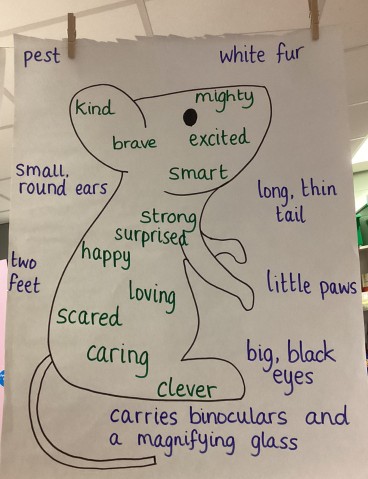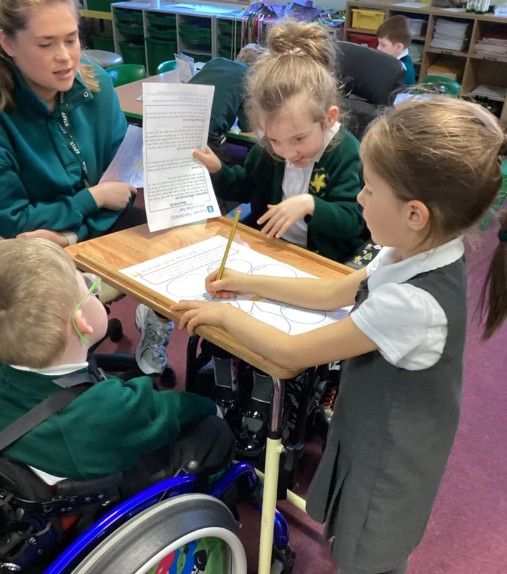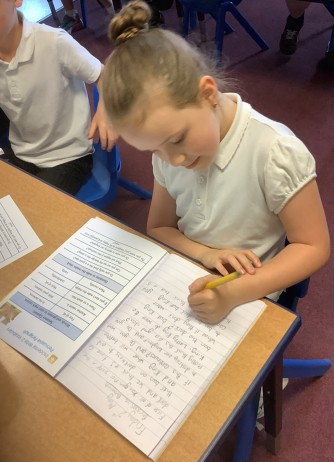| Intent
Writing
Our writing curriculum is designed to provide a broad and balanced education that meets the needs of all children. We follow the award-winning Ready Steady Write from Literacy Counts to develop confident, independent and successful writers with high aspirations. Our writing curriculum is research-informed and impact-proven, carefully designed to support all children to master the foundational skills and write for a clear audience and purpose. Through the use of high-quality, vocabulary-rich texts, we provide exciting and meaningful reasons to write. Children are immersed in literature and taught to craft their writing with precision, using a range of pedagogical approaches, including sentence accuracy, modelled writing and shared writing, as well as regular opportunities for editing. We value spoken language as a foundation for writing. Through structured talk, drama and vocabulary exploration, children learn how to organise and express their ideas clearly before writing them down. Our aim is for every child – regardless of need – to write fluently and take pride in their work. We want our pupils to leave primary school as enthusiastic writers, ready for the next stage of their education.
|
|
| Implementation (Overviews) |
|
| Early Years
Writing in EYFS involves transcription and composition
-articulating ideas and structuring them in speech, before writing). Language comprehension (necessary for both reading and writing) starts from birth. It only develops when adults talk with children about the world around them and the books (stories and non-fiction) they read with them, and enjoy rhymes, poems and songs together.
|
|
| Lesson Design |
|
| Daily Sentence Accuracy is a vital element of Read Steady Write and encompasses word, sentence, and punctuation from the statutory National Curriculum programme of study for writing and Vocabulary, grammar and punctuation. This daily practice also helps build fluency and stamina for writing.
After the Daily Sentence Accuracy, the lessons follow the immerse, analyse, plan then write sequence.
Within each lesson, children explore, enjoy and respond to the text in different ways; through teacher led, teacher modelled, shared activities, partner work and independent parts of the lesson.

|
|
| Impact
How do we know what children have learnt
|
|
| Literacy Counts draws upon a range of current assessment information, including statutory National Curriculum requirements and research to provide us with a comprehensive assessment resource. Through assessment and moderation, we will gain a thorough understanding of the progress and attainment of pupils, thus identifying gaps in learning and informing planning.
Children write confidently and ably for a wide range of purposes demonstrating both understanding and enjoyment of writing. Pupils show sound knowledge of all year group National Curriculum objectives in reading, writing, spelling, grammar and punctuation. Children showing Great Depth qualities to their writing are able to write using all of the above showing richness, flair and finesse.

|
Ready Steady Write Texts: Progression from Reception – Y6
|
|
Year Group
|
Autumn 1
|
Autumn 2
|
Spring 1
|
Spring 2
|
Summer 1
|
Summer 2
|
|
REC
|
The Something
|
Star in the Jar
|
Juniper Juniper
|
Little Red
|
The Extraordinary Gardener
|
The Storm Whale
|
|
1
|
Old Bear
|
Rapunzel
|
Hermelin
|
While the Wild Things are
|
The Secret of Black Rock
|
The Last Wolf
|
|
2
|
A River
|
The Night Gardener
|
The Bog Baby
|
Grandad’s Island
|
The King Who Banned the Dark
|
Rosie Revere, Engineer
|
|
3
|
The Iron Man
|
Fox
|
The Rhythm of the Rain
|
Jeremy Button
|
Egyptology
|
Into the Forest
|
|
4
|
The Whale
|
Leaf
|
Arthur and the Golden Rope
|
The Lost Happy Endings
|
The Journey
|
Manfish
|
|
5
|
When we Walked on the Moon
|
FarTHER
|
The Hound of the Baskervilles
|
The Promise
|
The Lost Book of Adventure
|
King Kong
|
|
6
|
Rose Blanche
|
A Story Like the Wind
|
On the Origin of Species
|
The Way of the Wolf
|
Shackleton’s Journey
|
Hansel and Gretel
|

|
|